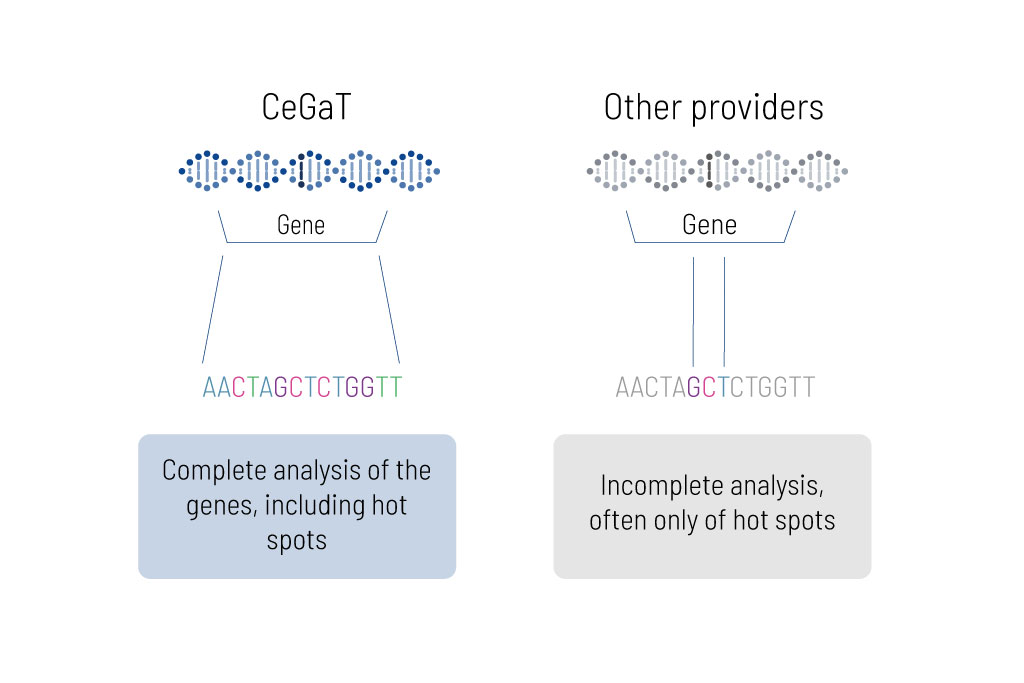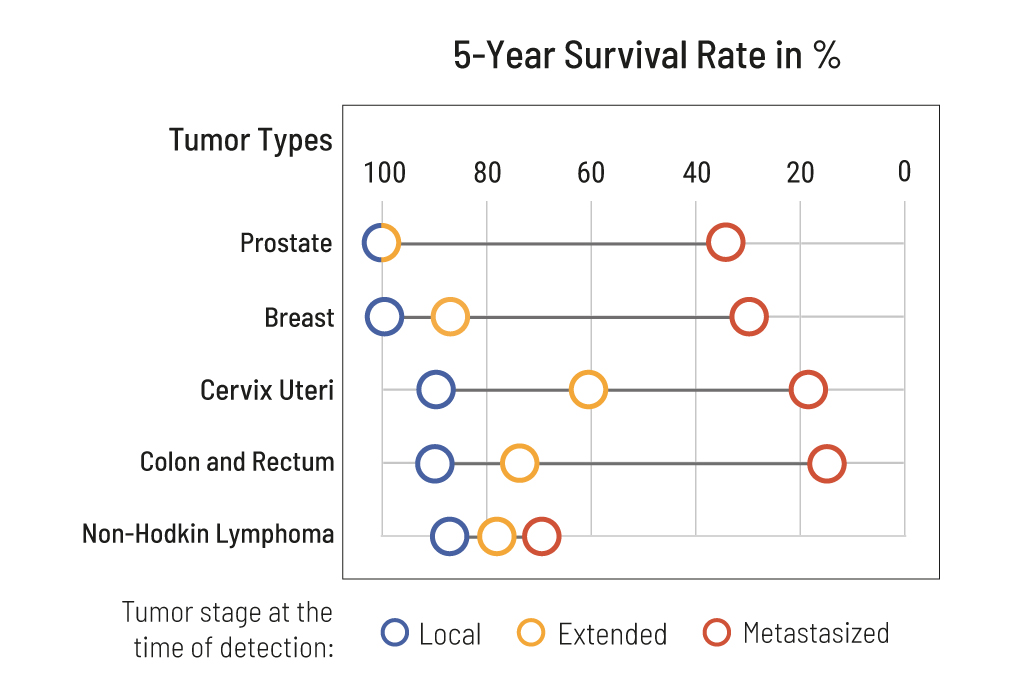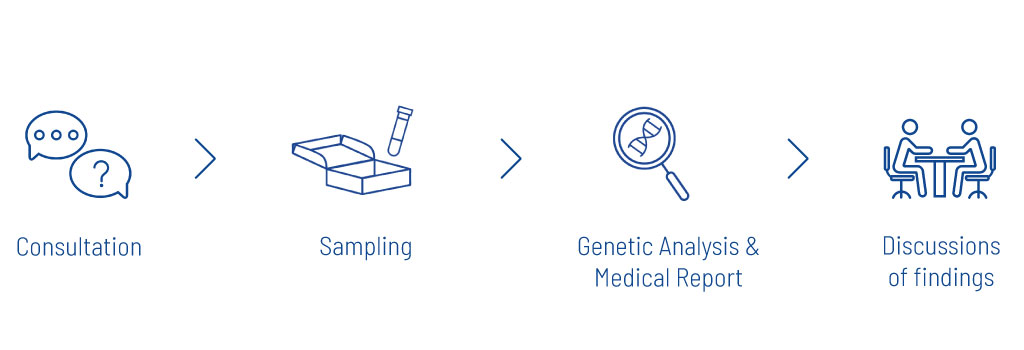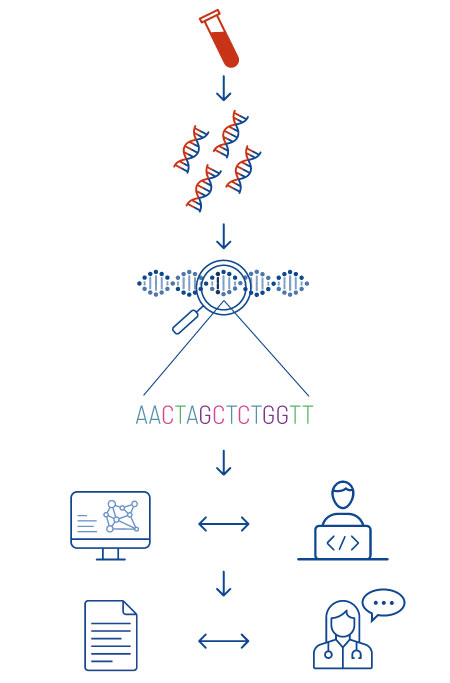Every human being is unique. This fact also applies to the genetic predisposition to various diseases. If you know your potential risk factors, you can actively help to stay healthy or mitigate a disease.
The analysis of specific genes for potentially disease-causing variants enables us to identify health risks early and thus helps to initiate targeted preventive measures. For example, we examine genes that increase the risk of thrombosis, or heart disease or we determine whether there is a genetic predisposition to a tumor disease. The result of the Disease Prevention Panel is a genetic guide to a healthier life!
Are you insured in Germany? Our colleagues at Zentrum für Humangenetik Tübingen will gladly support you!
The Advantages of Our Disease Prevention Panel
Your Possibilities for Prevention
We offer twelve different modules on genetic diseases, which can be selected individually or in combination.
Cardiovascular Diseases
Vascular diseases can develop gradually, and heart diseases are often discovered too late.
Thrombosis & Coagulation Disorders
Thromboses can cause e.g., strokes and pulmonary embolisms.
Iron & Copper Storage Disorders
An early diagnosis of these diseases can minimize related complications.
Malignant Hyperthermia
Malignant Hyperthermia (anesthetic complication) is a rare, but potentially life-threatening complication.
Adult-Onset Inborn Errors of Metabolism
Inherited metabolic defects can also only become apparent in adulthood.
Kidney Diseases
Kidney diseases are often only discovered when their function is already impaired.
Actionable Core Gene Set According to ACMG
Variants in these genes lead to diseases that are treatable.
Four Reasons for CeGaT’s Disease Prevention Panel

Certified Laboratory
All samples are processed in-house. CeGaT’s laboratory is accredited according to CAP/CLIA and DIN EN ISO 15189 and ensures reliable results.

Long-Lasting Health
A genetic analysis by CeGaT can save lives. By identifying genetic predispositions, diagnoses can be made at an early stage, and measures that increase the quality of life and chances of survival can be taken in a timely manner.

Risk Genes in Focus
We only examine relevant genes that have been scientifically confirmed as risk genes and pose a risk of disease that can be reduced by timely detection or adequate prevention. You can find out which genes are examined here.
Comprehensive Analysis of Genes
Using next-generation sequencing, we analyze the sequences of the selected genes in their entirety and do not limit ourselves to so-called hotspot regions. This ensures that no relevant information is overlooked and provides you with reliable findings.
Field Reports

Oliver S., 45 years
Life style: activ in sports, high travel activity
Result: our preventive diagnostics identified the Factor V Leiden mutation in Oliver S., which increases the risk of thrombosis.
Consequence: Oliver S. is aware of thrombosis and takes preventive measures when he has to sit on a long-haul flight, for example.
“I now know that I have a genetic variant that increases my risk of thrombosis. As I travel a lot by plane, I now try to stand up and move around more during a flight to prevent thrombosis.”
Anna M., 32 years
Life style: conscious diet, normal sleep patterns, regular exercise
Result: Our preventive diagnostics revealed an increased tumor risk in Anna M. due to a variant in the BRCA1 gene. A genetic change in the BRCA1 gene increases the risk of developing breast and ovarian cancer, among other things.
Consequence: Anna M. has a detailed check-up every six months and is closely monitored.
“I now know about my predisposition and regularly have cancer prevention tests. Based on my results, my sister also got tested and found out that she is a carrier of the same variant. The test has helped us both.”

Would you like to find out more about CeGaT’s Disease Prevention Panel based on other examples?
Early Detection Plays a Crucial Role, Especially in Tumor Diseases
Figure 2: 5-year survival rate depending on the stage and type of tumor. If the tumor is detected early and has not yet metastasized (blue circle), the chance of survival is 87-100% higher than at a later stage when metastases have formed (red circle).1
For tumor diseases, the following applies: the earlier a tumor is detected, the better the prognosis. The figure illustrates this principle using different tumor entities. If the tumor is diagnosed during the early stages (local), the chance of surviving for five years or longer is 87% to 100%. Survival rates significantly decrease if the tumor is detected after it has metastasized. CeGaT‘s Disease Prevention Panel checks whether there is an increased risk of tumor disease, and therefore, extended early detection measures should be taken.
Each genetic analysis with CeGaT’s Disease Prevention Panel provides a detailed report containing the test results, the recommended next steps for the person seeking advice and details of the scientific methods used.
Our Experts
Which Genes Are Analyzed?
The individual modules of CeGaT‘s Prevention Panel contain genes that have been scientifically confirmed as risk genes and pose a risk of disease that can be reduced by timely detection or adequate prevention. The compilation of genes is based on the recommendations of the American College of Medical Genetics and Genomics (ACMG) and has been supplemented by our specialists with other known risk genes.
General Information
Genetic Counseling
Our genetic counseling provides detailed information to those seeking advice about their genetic testing options and further procedures. During the consultation, we also discuss which genes can be analyzed. We want to ensure that all relevant questions are answered and that people seeking advice can make informed decisions about their health.
Genetic Analysis and Result
Our in-house laboratory analyzes the genes using an advanced technology called next-generation sequencing, or NGS for short. To do this, we isolate the DNA from the cells in the blood sample (figure 3) and then read the individual building plan of the DNA step by step (sequencing). We do not limit ourselves to so-called hotspot regions. Instead, we read the genes in their entirety.
The sequenced information is then analyzed in-house. We investigate whether particular characteristics or changes (variants) in the genes are associated with an increased risk of disease and play a role in individual health care. We compile the results in a report and conclude by explaining what significance this could have for the health of the person seeking advice.
Further details on sample material and shipment can be found here.
Frequently Asked Questions
Before Choosing a Test
Sample & Analysis
Result & Consultation
Storage and Data Protection
Preventive Healthcare for Companies
Companies and healthcare facilities rely on our many years of experience and expertise in genetic diagnostics.
Are you also interested in preventive healthcare for your employees?
Contact Us
Do you have a question, or are you interested in our service?
Diagnostic Support
We will assist you in selecting the diagnostic strategy – whether as a person seeking advice or as a physician.













